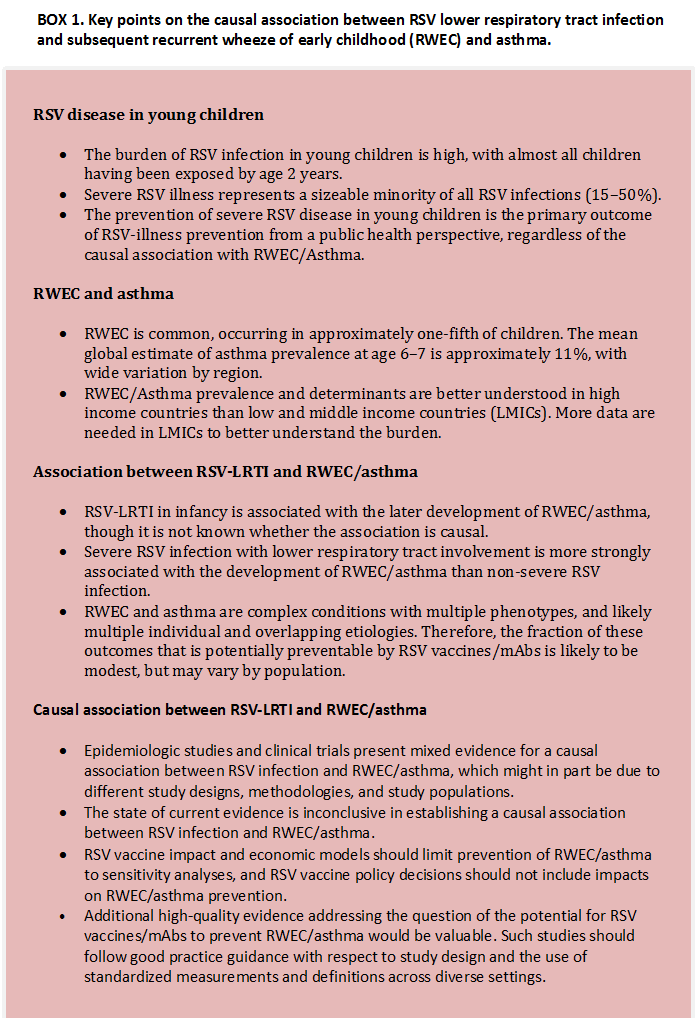Vaccinology Update
Does RSV lower respiratory illness in early life cause recurrent wheeze of early childhood and asthma?
Respiratory syncytial virus (RSV) is a leading cause of lower respiratory tract infection (LRTI) and hospitalization in infants and children globally. Many observational studies have found an association between RSV LRTI in early life and subsequent respiratory morbidity, including recurrent wheeze of early childhood (RWEC) and asthma. Conversely, two randomized placebo-controlled trials of efficacious anti-RSV monoclonal antibodies (mAbs) in heterogenous infant populations found no difference in physician diagnosed RWEC or asthma by treatment group. If a causal association exists and RSV vaccines and mAbs can prevent a substantial fraction of RWEC/asthma, the full public health value of these interventions would markedly increase. The primary alternative interpretation of the observational data is that RSV LRTI in early life is a marker of an underlying predisposition for the development of RWEC and asthma. If this is the case, RSV vaccines and mAbs would not necessarily be expected to impact these outcomes.
Respiratory syncytial virus (RSV) is a leading cause of lower respiratory tract infection (LRTI) and hospitalization in children globally, causing an estimated 33.1 million LRTI episodes, 3.2 million hospitalizations, and 118,000 deaths in 2015. An estimated 45% of all hospitalizations and deaths are in infants less than 6 months of age, with 99% of global RSV mortality occurring outside of North America and Europe. The only licensed monoclonal antibody (mAb) to prevent RSV LRTI (Synagis_, palivizumab) is recommended only in high-risk infants (e.g. preterm or with certain co-morbidities) and is cost prohibitive for low and middle income countries (LMICs). There are no licensed vaccines for RSV; however, several candidate products (e.g., vaccines and mAbs) are in clinical development.
A long-standing question is whether RSV LRTI in early life causes subsequent recurrent wheeze of early childhood (RWEC) and asthma. The current evidence supporting a causal association between RSV and RWEC/asthma is mixed. Understanding whether prevention of RSV LRTI can lead to reductions in rates of RWEC and asthma will contribute important information to policy decisions regarding RSV vaccines and mAbs.
To shed light on this important question, the World Health Organization (WHO) undertook three activities. The first comprised an analysis of the sample size required to estimate the potential impact of RSV prevention by vaccines or mAbs on the subsequent development of RWEC in RCTs. The second was a systematic review and meta-analysis that will be reported separately. Third was a convening of subject matter experts on February 12–13, 2019 in Geneva, Switzerland. The objectives of the meeting were: (i) to evaluate the strength of the current evidence for a causal association between early life RSV LRTI and subsequent RWEC/asthma, (ii) to evaluate the evidence that future RSV vaccines/mAbs can reduce rates of RWEC/asthma, and (iii) to provide methodological guidance for future studies.
After discussing relevant background information and reviewing the current epidemiologic evidence, the group determined that: (i) the evidence is inconclusive in establishing a causal association between RSV LRTI and RWEC/asthma, (ii) the evidence does not establish that RSV mAbs (and, by extension, future vaccines) will have a substantial effect on these outcomes and (iii) regardless of the association with long-term childhood respiratory morbidity, severe acute RSV disease in young children poses a substantial public health burden and should continue to be the primary consideration for policy-setting bodies deliberating on RSV vaccine and mAb recommendations. Nonetheless, the group recognized the public health importance of resolving this question and suggested good practice guidelines for future studies

Original Citation: A. J. Driscoll, S. H. Arshad, L. Bont et al., Does respiratory syncytial virus lower respiratory illness in early life cause recurrent wheeze of early childhood and asthma? Critical review of the evidence and guidance for future studies from aWorld Health Organization-sponsored meeting, Vaccine, https://doi.org/10.1016/j.vaccine.2020.01.020

